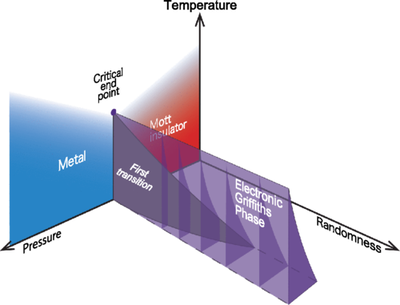PRESS RELEASE
- Research
- 2020
Electronic Griffiths Phase in Disordered Mott-Transition Systems
Authors
Riku Yamamoto, Tetsuya Furukawa, Kazuya Miyagawa, Takahiko Sasaki, Kazushi Kanoda, and Tetsuaki Itou
Abstract
Solid-state physics and soft-matter physics have been developed independently, with little mutual exchange of the underlying physical concepts. However, after many studies of correlated electron systems, it has been recognized that correlated electrons (especially in Mott-transition systems) in solid matter sometimes show behavior similar to “structured fluids” in soft matter; that is, the electrons exhibit long-length self-organization (but without long-range order) and slow dynamics, which is inevitable for the long-length structures. The essential question is this: what condition causes such behavior in solid matter? We focused on an organic Mott-transition system and demonstrated that the electrons of this system fluctuate very slowly only when the following two factors are met simultaneously: (i) the electronic system is on the metal and Mott-insulator boundary and (ii) the system is subject to quenched disorder. This electronic state with slow dynamics under this condition can be explained by the concept of the “(electronic) Griffiths phase.” This concept will potentially be a key in connecting solid-state physics with soft-matter physics.

Press Release: PDF file
Physical Review Letters: https://journals.aps.org/prl/abstract/10.1103/PhysRevLett.124.046404
Tokyo University of Science: https://www.tus.ac.jp/en/mediarelations/archive/20200213001.html
EurekAlart!: https://www.eurekalert.org/pub_releases/2020-02/tuos-seb021320.php

